How To Determine Truth

“The truth will set you free” is a statement that is literally true, as we will never become free unless people learn and then begin acting based on truth.
Several important truths have already been shared: morality, our rights, self-defense, Natural Law, and personal responsibility.
But there are many more truths that humanity must come to understand.
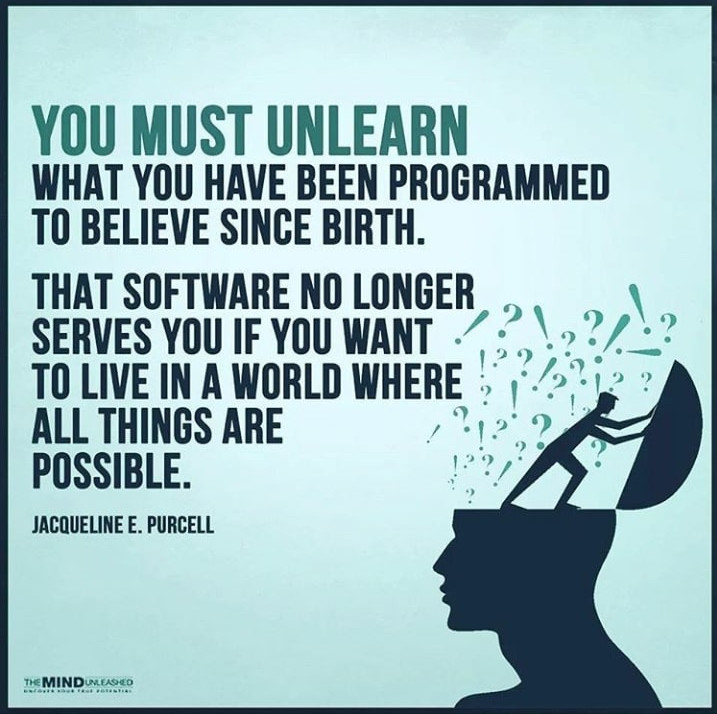
How does one know something is true?
- Because a teacher or professor told them it was true?
- Because a school textbook told them it was true?
- Because professionals (doctors, dentists, scientists, etc.) told them it was true?
- Because a religious leader told them it was true?
- Because the government told them it was true?
- Because their parents told them it was true?
- Because the news told them it was true?
- Because someone on TV told them it was true?
- Because a website told them it was true?
- Because most people believe it to be true?
- Because I say it’s true?
What if the truth is that none of these is a valid way to know if something is true? In fact, trusting others to tell the truth will almost always lead us away from the actual truth.
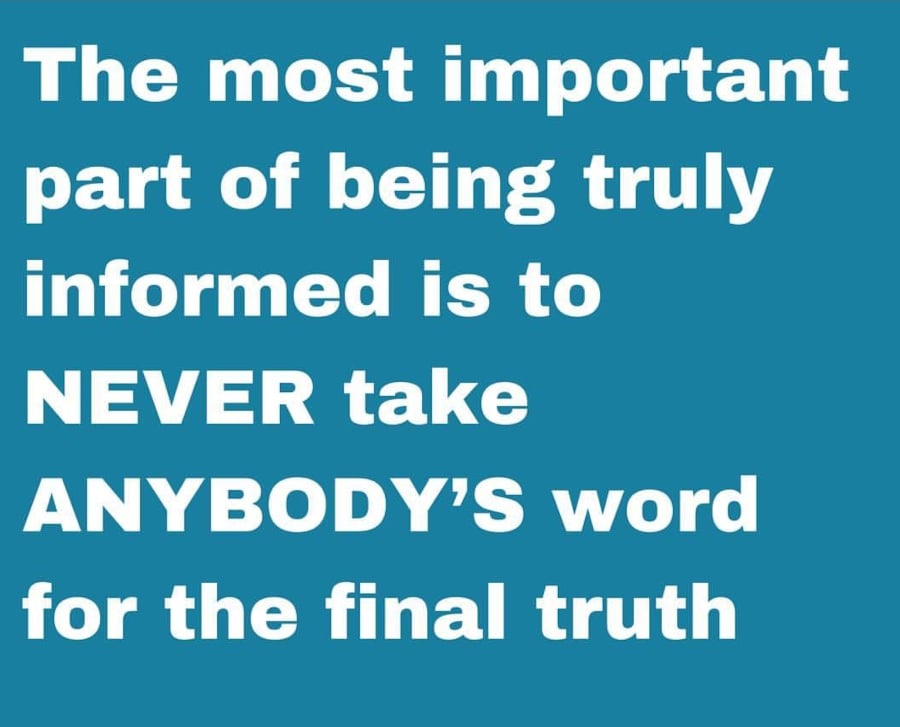
The only way to know if something is true is by verifying it for ourselves, using an open but critical mind. This must be done using our eyes, brain, logic, and analysis.
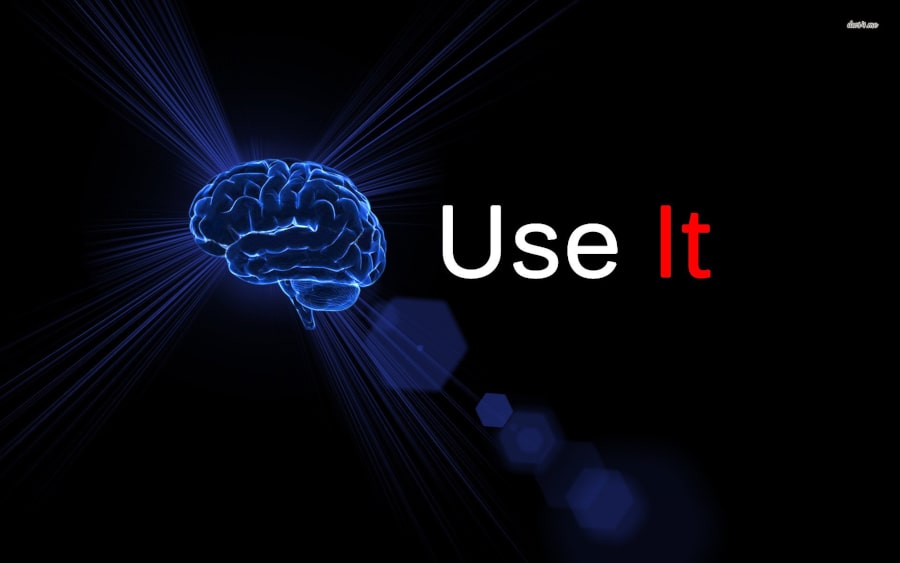
Steps for Determining Truth
What follows are the steps that will help determine the truth about almost any topic. These steps must be done in the order in which they’re presented.
Step 1 – View everything as possibly true
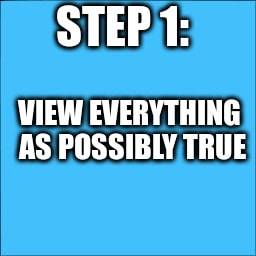
The first step is to have a truly open mind, and consider everything as possibly true. This means being neutral about every piece of information, no matter how crazy something may sound, or how obvious something may sound. Do not accept nor reject new information. From this position of neutrality, viewing everything as possibly true, you place yourself in the absolute best position to arrive at the truth.
And truth is indeed stranger than fiction, so it's important to maintain this position of neutrality, keeping an open mind with regard to everything you see, read, and hear.
As an example of Step 1, if you read that a group of scientists has written an article claiming that fluoride is not safe to ingest, you would consider what they’ve written as being possibly true. You would not accept it, but you would not reject it either. You would take their claim and move on to Step 2.
Step 2 – Look at a wide range of sources regarding the information
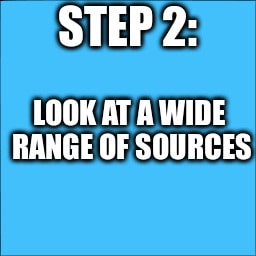
This step is most easily completed when you have access to the Internet, as the Internet is currently the best source for independent research (in most countries). However, please note that the window of opportunity to learn the truth through the Internet is rapidly closing, thanks to increasing censorship. For Step 2, you will take the information you encountered in Step 1 and begin looking at it using a wide range of sources. This means looking at popular websites, alternative websites, independent websites, and even video and podcast websites. Books and other published information can also be used in this step. Gather as much information as possible from as wide a range of sources as possible, and then you’re ready to move on to Step 3.
Important note: mainstream sites and platforms like YouTube, Google, Facebook, along with disinformation sites like Snopes and Science Based Medicine are aggressively working to promote false information and prevent the dissemination of truth, so take the information provided by and filtered through these and other mainstream sites and platforms with a large grain of salt.
In the example, if some scientists have written that fluoride is not safe to ingest, for this step, you would learn about fluoride at official websites, alternative websites, holistic health websites, and even on video websites. You could also look at books and other published information. This will ensure that you gather a wide range of viewpoints and data.
Step 3 – Use your brain to logically determine what is true
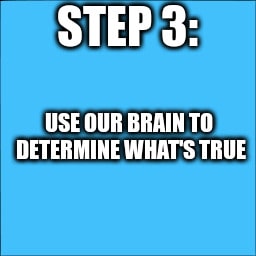
The final step is to take the information you gathered in Step 2 and use your brain to determine what's true. This may seem difficult at first, but once you've done it a few times and recognized certain patterns, it becomes relatively easy.
In the example, under Step 2, you would have found a large amount of scientific evidence supporting the idea that fluoride is not safe to ingest, along with some statements by some dentists and the government that fluoride is safe to ingest. You would also likely have discovered evidence of corruption, disinformation, and criminality in an effort to promote the theory that fluoride is safe to ingest. So now, in Step 3, you'll use your brain to filter and analyze the information gathered and come to a conclusion. Your conclusion, based on an overwhelming amount of evidence, is that fluoride is not safe to ingest.
This 3 Step Process should be used when you see, read, or hear any information whatsoever, and you should even go back and apply it to information you were taught in school, or have learned from the news or television. If you use this process, you'll discover that much of what you thought was true is actually not true. And when you expand your investigation into different topics, you'll uncover an extensive web of lies.
Once you’ve gained an understanding of the truth about a topic using this 3 step process, it becomes important that you use the knowledge in your own life, and pass it on to others through speaking, writing, or other forms of expression.
In the example, when you learned the truth that fluoride is not safe to ingest, you would take action to eliminate fluoride from your drinking water and toothpaste, and share what you learned with others so they have the opportunity to do the same.
This overall truth-determining-and-sharing process is also known as the Trivium, which is an ancient method of learning that was removed from schools long ago.
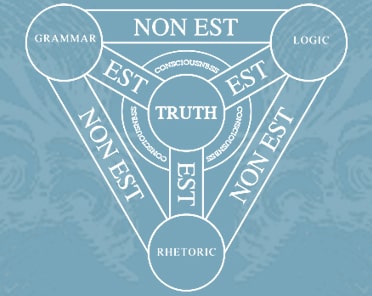
The Trivium is much like an anti-virus program for the collective human mind.
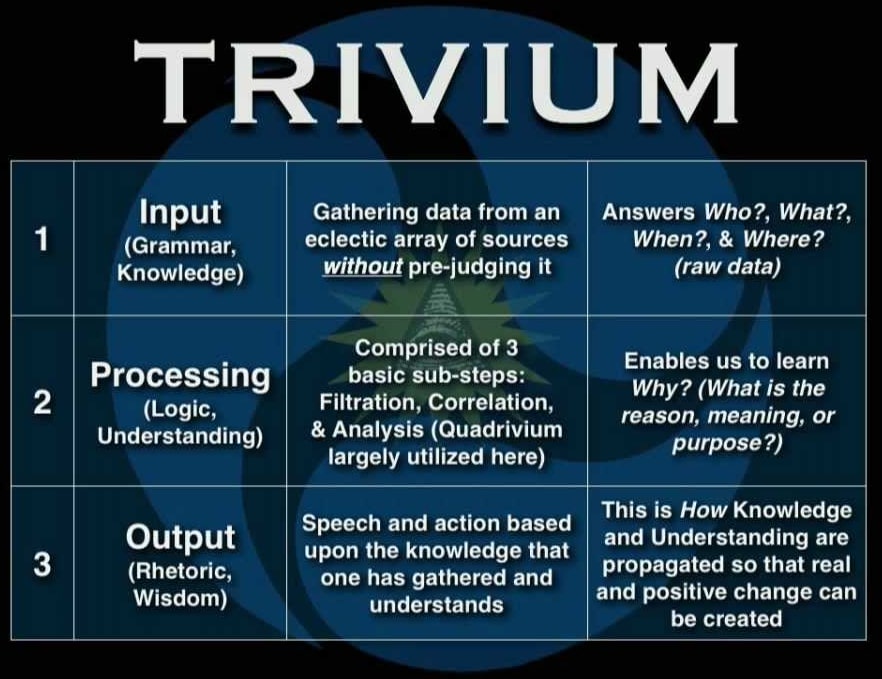
Because people in general do not follow this process of truth-determining-and-sharing, those in control have taken full advantage, planting seeds of disinformation and misinformation in practically everyone’s minds concerning a wide variety of topics. As a result, most people believe layers upon layers of false information.
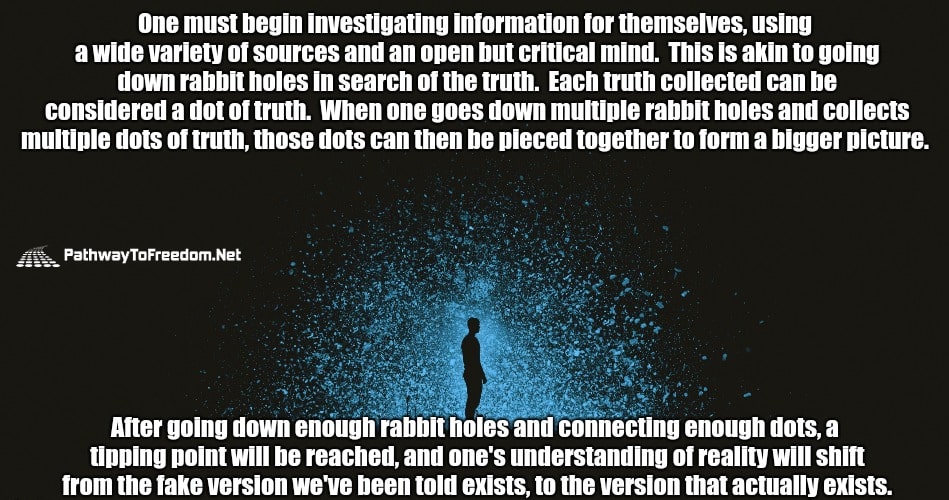
Question Everything and Consider Everything
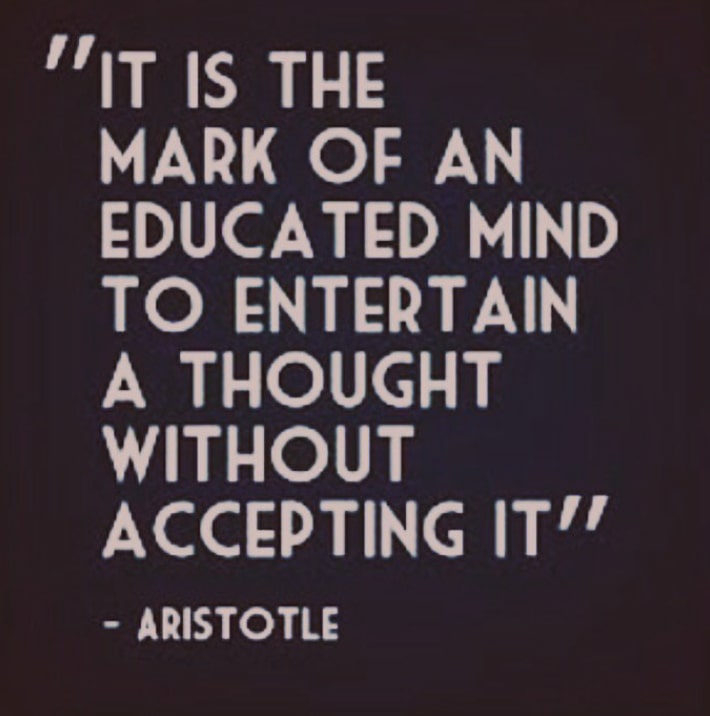
It's very important to question everything, including ideas we already believe to be true, and even that which I’m presenting on this site.
"Read everything, believe nothing, until you can prove through your own efforts whether it is true or false, or lies somewhere in between..."
-William Cooper
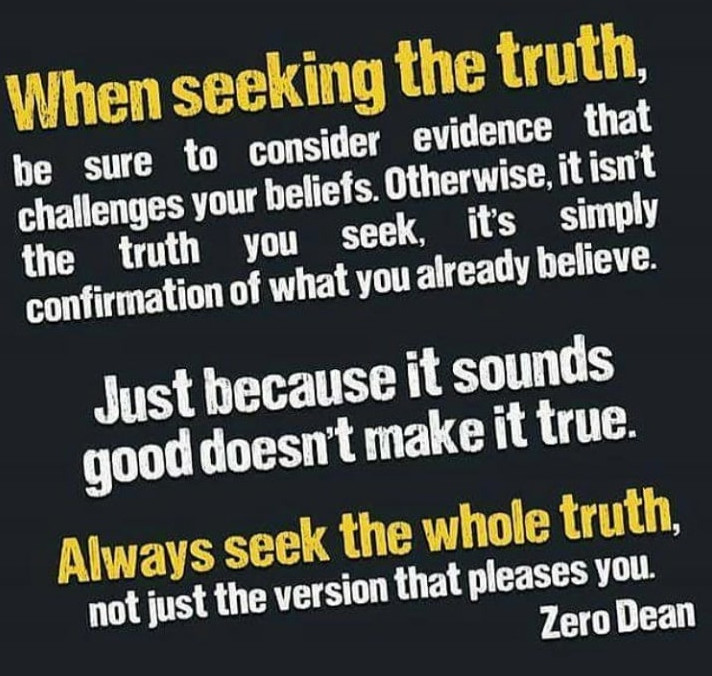
Being unwilling to question what we've been told and change our minds will result in us remaining in states of powerlessness.
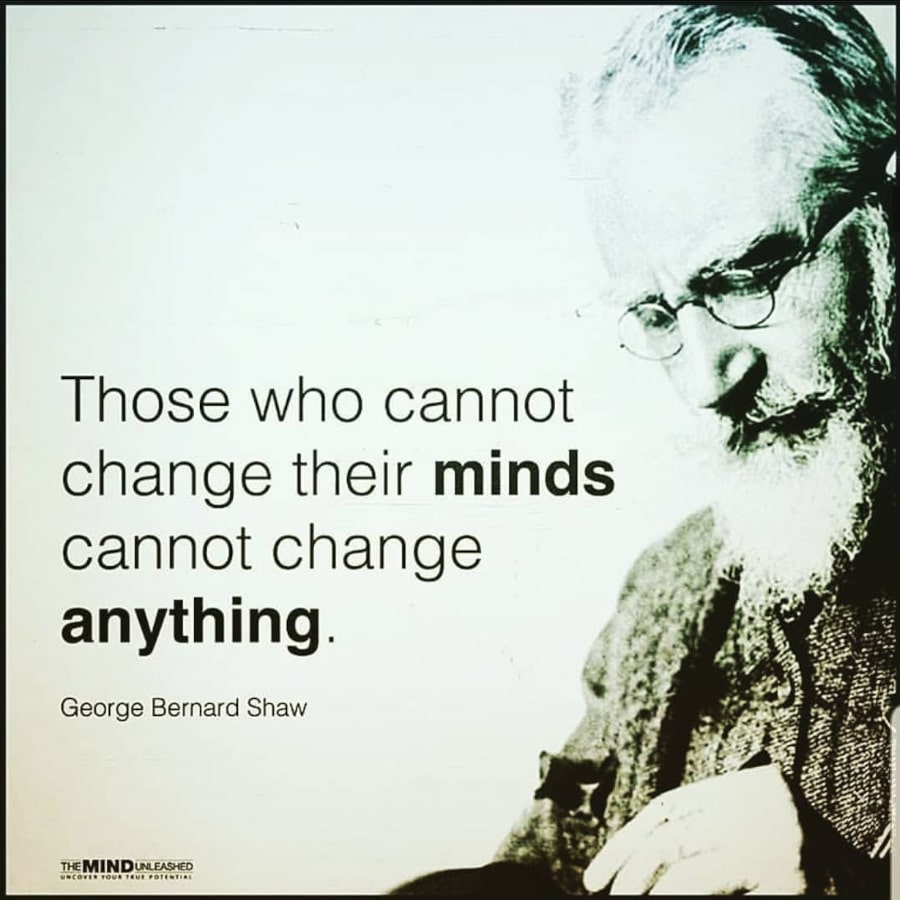
The reason we need to question what we've been told is because we are living in a world awash in lies. The web of lies has been spun by those atop the control system and the individuals and agencies beneath them.
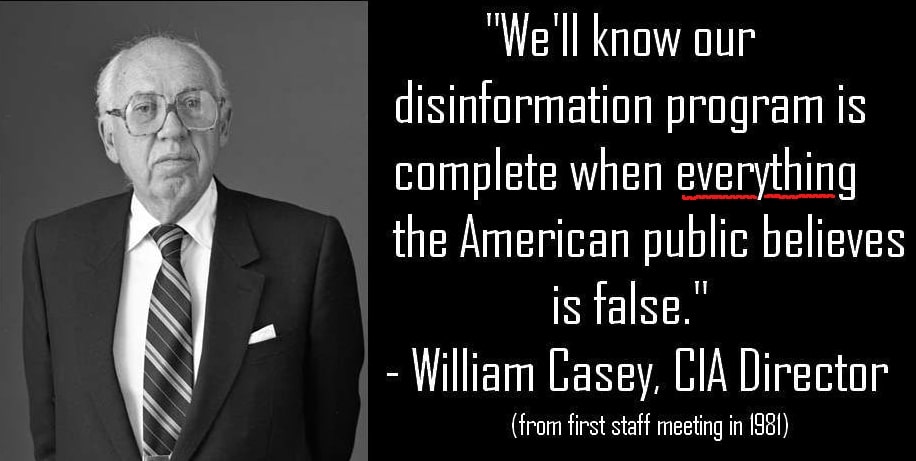
Part of the reason those in control are so successful at convincing people to believe information that is not true is because most people don't want to even look at information that goes against what they’ve been programmed to believe. They choose to ignore it and simply pretend it doesn't exist, just to maintain their current programmed belief system, which provides them with what they believe to be a level of comfort.
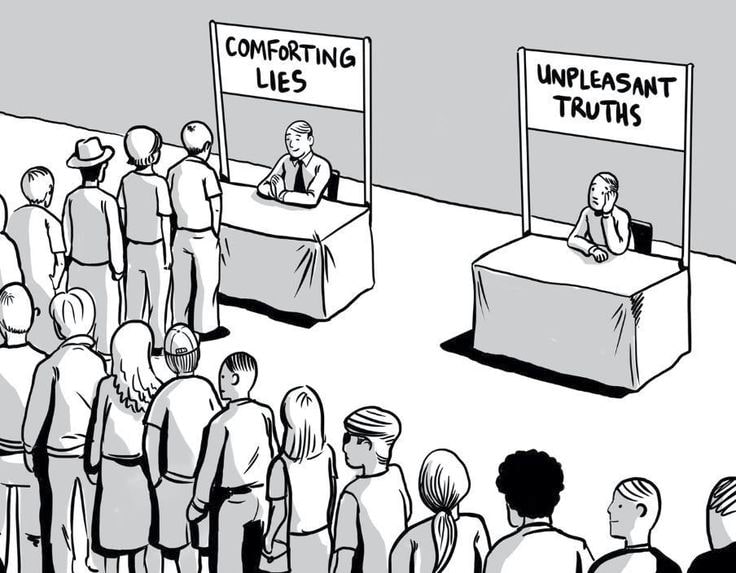
For most, it’s too disturbing to consider that they’ve been lied to their entire lives, and have accepted all of these lies as truths. It’s painful to learn that the world we’ve always believed in is not the world we’re living in, and that we are, in fact, slaves.
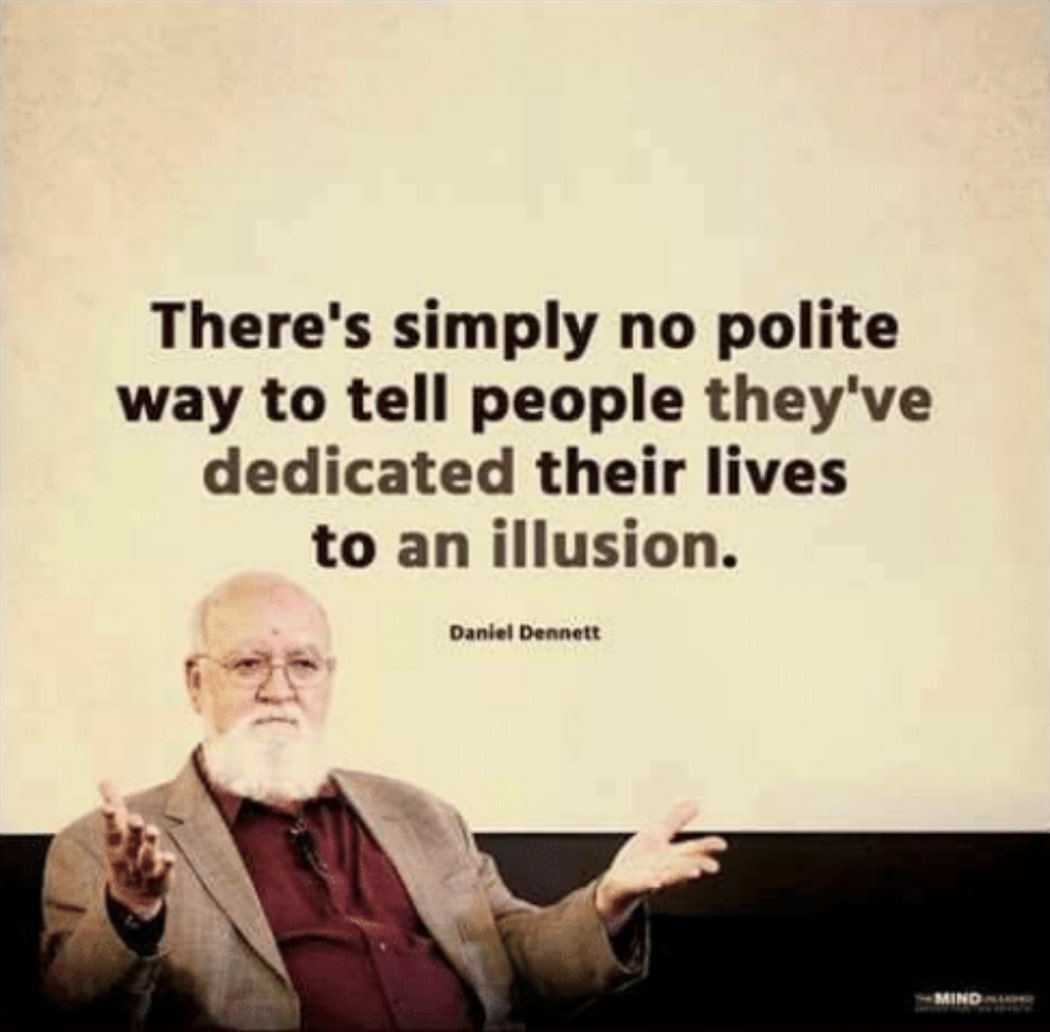
So they choose to simply continue believing what they want to believe.
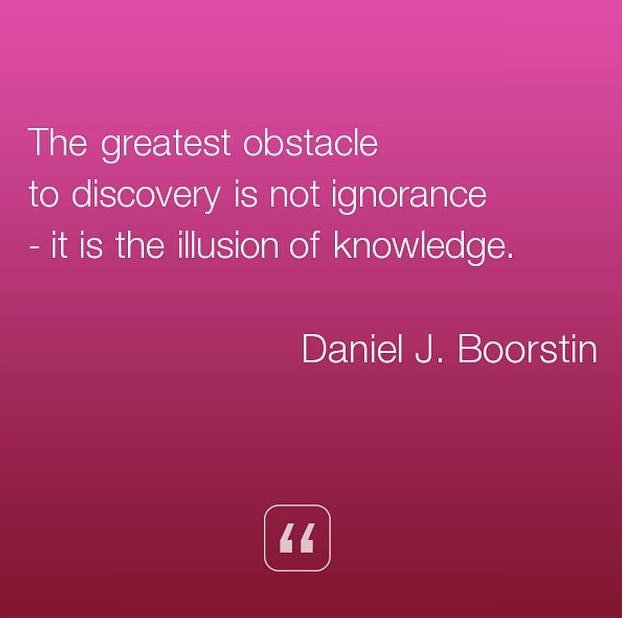
The following cartoon symbolically demonstrates the internal workings of a typical person’s mind when they hear or read something that goes against that which they've been programmed to believe by their government and the mainstream media:
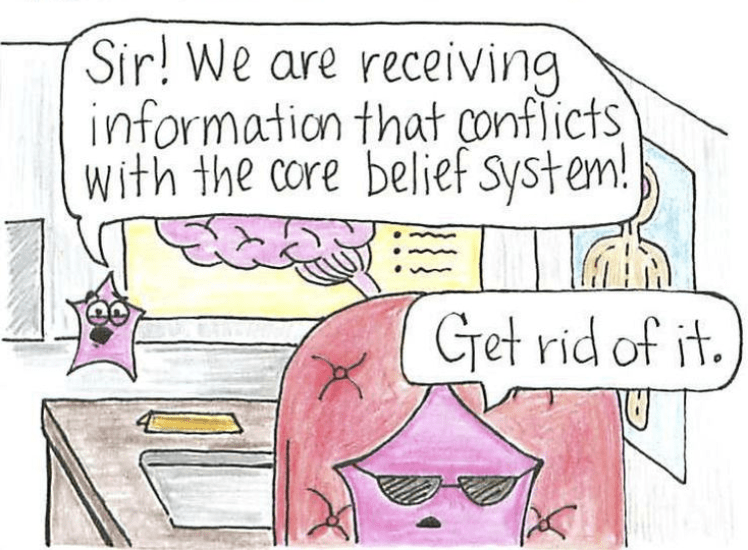
Most people reject new or different information automatically, without even considering that it might be true. It’s easier to simply dismiss it as part of some unbelievable conspiracy theory, than to take the time and effort to actually determine if it’s true. Most choose to remain stuck in a state of comfortable denial.
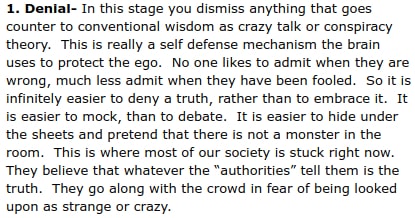
http://dont-tread-on.me/?p=454
Hearing information contrary to previously accepted beliefs often causes one to enter into a state called cognitive dissonance, a condition in which one cannot reconcile the newly presented information with their pre-existing belief systems.
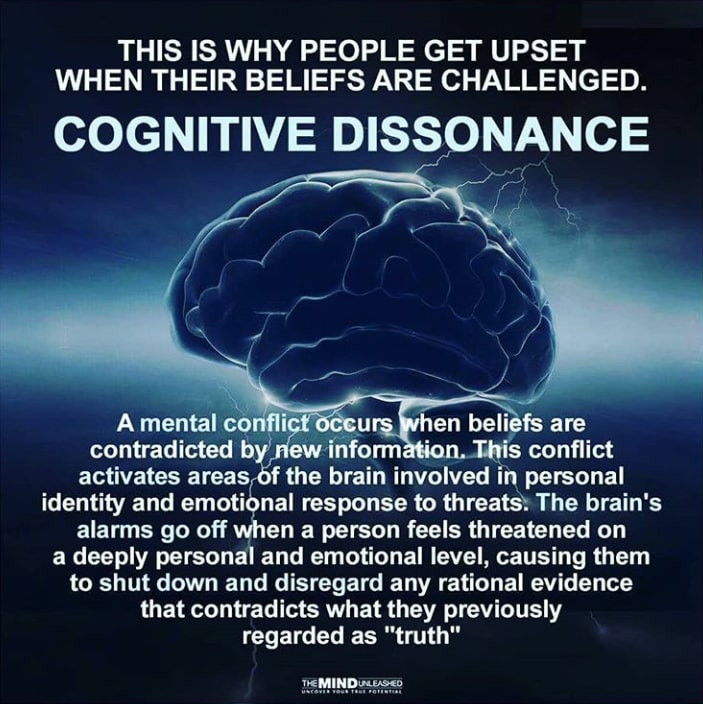
While it’s easy to dismiss someone’s claims that seem outlandish, it’s critical that we stop and take a closer look at what they’re saying. Is what they’re saying really crazy, or is it possibly true and it simply threatens our programmed beliefs? In most cases, the latter is true.
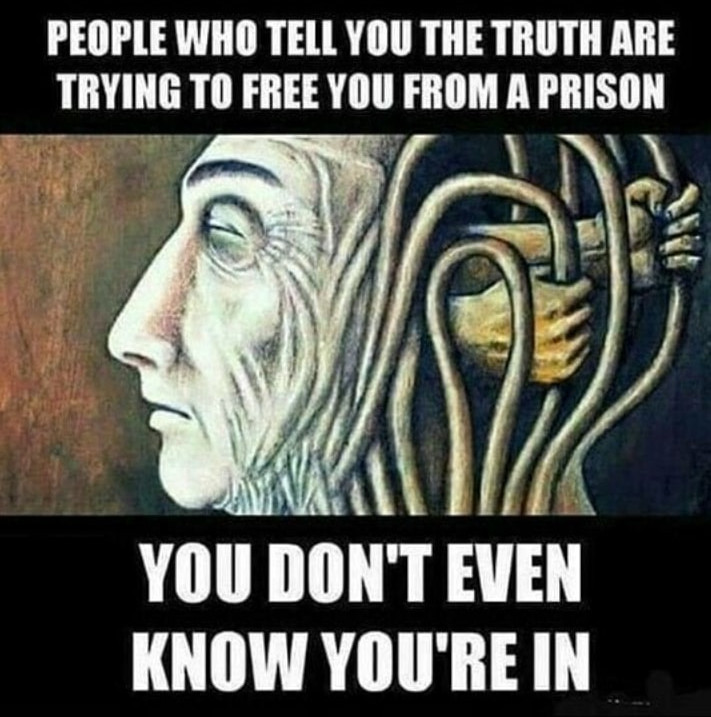
The truth is corrosive. It makes people angry and defensive because it directly opposes mind control. It goes against what people have been programmed to believe, and it breaks down the false narratives accepted by and defended by the ego.
It is viewed by those who are brainwashed as a direct threat to their very being. It’s an insult to their intelligence.
Many of the lies are so big that people have trouble even considering that they could be lies. This is by design. The bigger the lies, the more likely they'll be believed. “There’s no way they could be lying about THAT. And there’s no way they could have fooled ME.” It’s easier to just dismiss the information and go back to blindly believing what they’ve been told.
Almost exclusively, those who are censored, criticized, or ridiculed are the very ones speaking the truth, while those propagating lies are placed in the limelight of the mainstream.
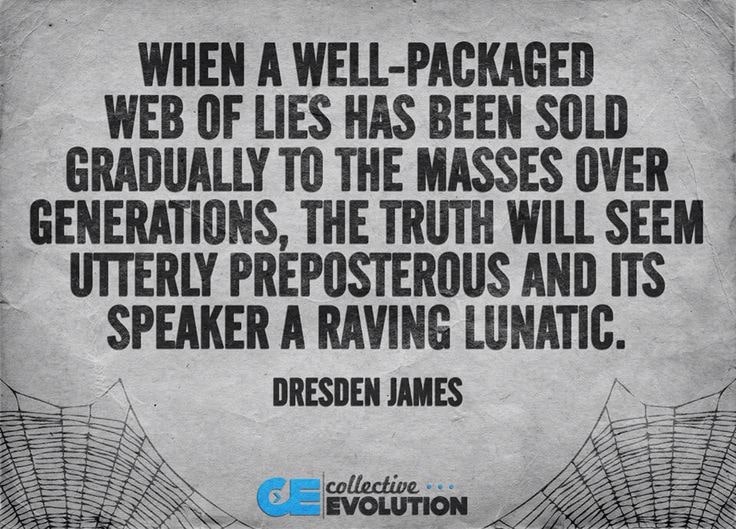
Censorship and personal attacks occur because those who speak the truth threaten belief systems relied upon by governments and the control system.
But those who take the time to examine the facts ultimately and invariably discover that they’ve been lied to.
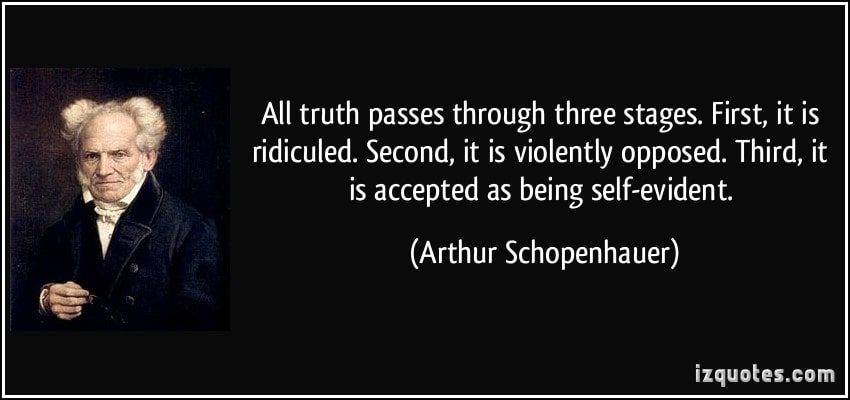
Look and Think Outside the Box
It's also critically important to have an open mind, and look at both sides of an issue. Those who wish to keep us ignorant will tell us to avoid the very sources sharing the truth, telling us that they're "crazy conspiracy theorists", or they'll do their best to censor these sources so we don't ever see them in the first place.
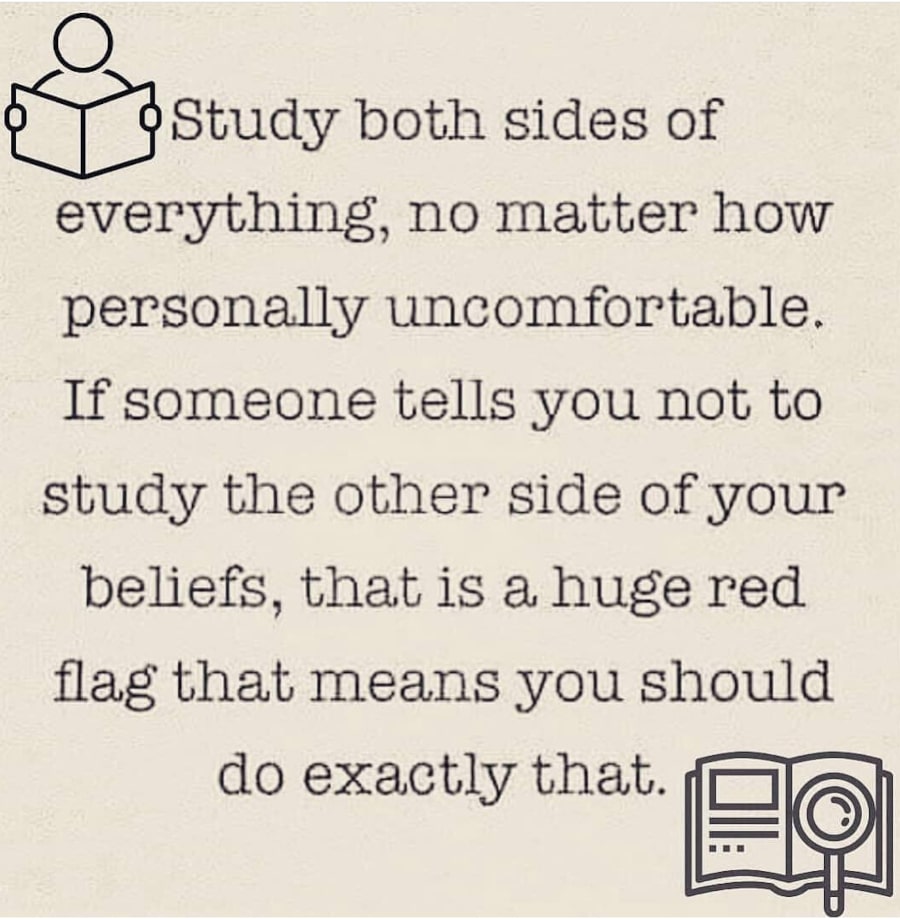
Looking at as many different sources as we can is important because, in almost all cases, the truth will not be provided by ANY mainstream source, including the mainstream news, government, education system, medical system, or scientific community. All of these sources are corrupt, and have been corrupt for a very long time. The truth will not be handed to us on a silver platter; we must expand our horizons, dig deeper, and discover it for ourselves.
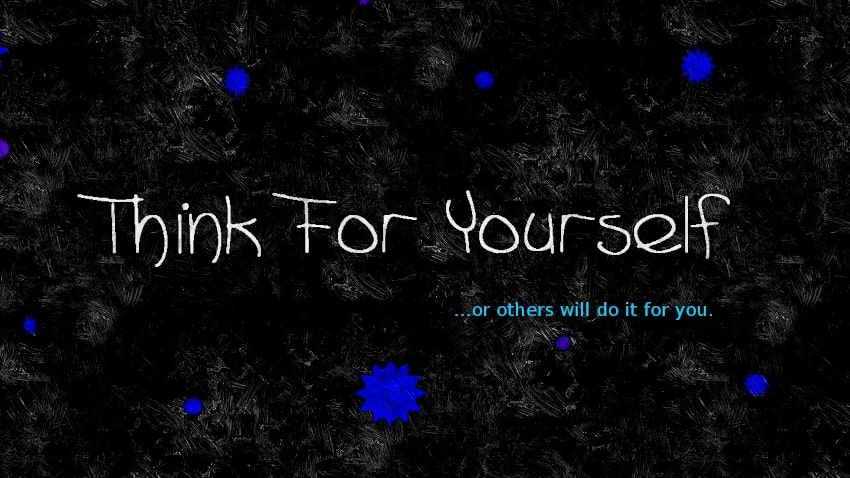
Re-search = To Search Again
Learning the truth ourselves through independent research will place us in an infinitely better position than that of those who’ve only learned from that which has been spoon-fed to them by so-called authorities.

“I'm too lazy. There’s too much information out there, I don't feel like figuring out what's true, and I just don’t care."
Many people have this attitude and, while they think it doesn't matter, it actually matters very much. When we leave the thinking and fact-checking to others, we're a perfect target for those who wish to fill our minds with disinformation, with the ultimate goal of manipulation and harm. And when a majority of people have been fooled, we all suffer the consequences. If people don’t think for themselves and question everything, they WILL be taken advantage of. It’s a guarantee. Not investing the time, effort, and attention in figuring out what’s actually going on is nothing short of complete spiritual failure.
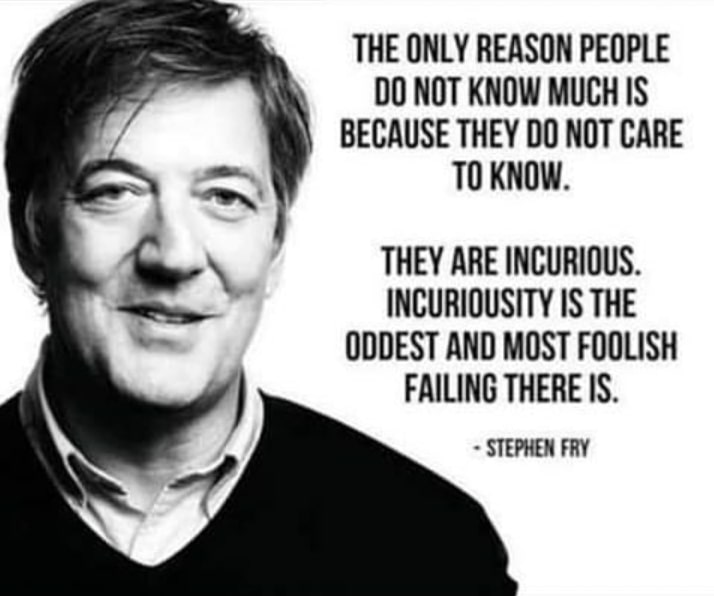
In spite of increasing censorship, in most countries the Internet is still the best source for learning what’s true.
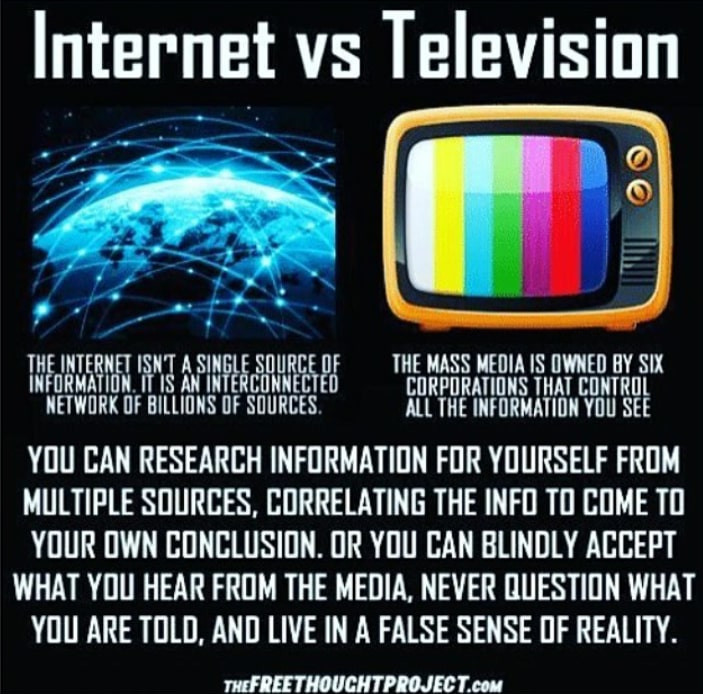
Part of growing into a conscious being is taking responsibility for what we accept as true. If we want to move forward in life, we can no longer blindly accept what we’re told.
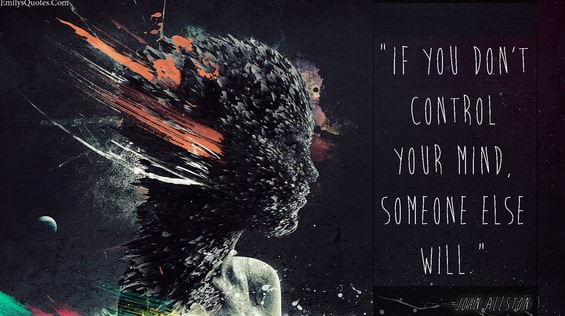
Not only will people control our mind if we allow them, but they’ll do it to their advantage, and our disadvantage. They’ll turn us into victims. The only way to avoid becoming a victim is to begin using our own mind and figuring things out for ourselves.
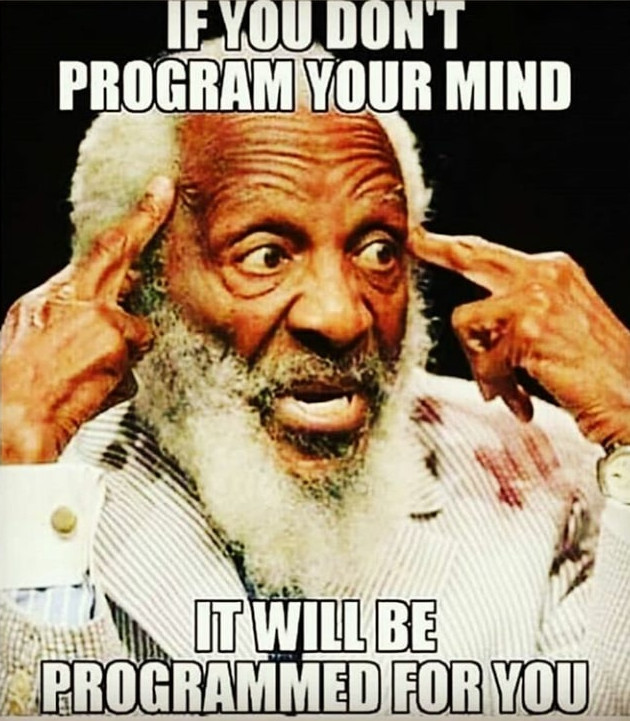
Recognizing Fallacies
Once we've memorized the 3-step process for determining truth, it’s important to add another tool to our repertoire to help us discern between truth and lies: Knowledge of Fallacies.

What’s a fallacy? A fallacy is a misconception resulting from incorrect reasoning. In other words, it’s a lie supported by a faulty or deceptive argument.
A lie can just be a simple lie, such as “Vaccines saved us from many diseases.” But more often, the lies come wrapped in fallacies.
If we fall in real life, we're no longer moving forward, and we may even hurt ourselves.

When we believe a lie, we have “fallen” for that lie. This is where the word ‘fallacy’ (fall-acy) comes from. When we fall for a lie, it’s no different than falling in real life; we're no longer upright, no longer moving forward, and we're often hurting ourselves. The word ‘false’ is also related.
Becoming aware of the different types of fallacies is a key skill that will help us to determine what’s true and what’s a deception. It will also help us determine who is trying to deceive us and why.
There’s a reason they don’t teach children about fallacies in school, and that’s to ensure they can be victimized using these techniques for the rest of their lives.
While there are many different fallacies, below are a few of the major ones.
Appeal to Authority – Appeal to Authority is where we believe something is true because an authority says it. Just because an authority says something is true doesn’t make it true. Example: “My doctor said the medications I’m taking are safe and will help me, and he’s a doctor, so he must be telling the truth.”
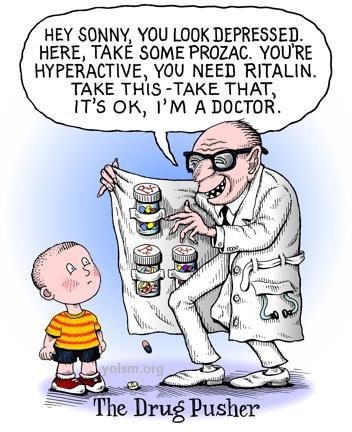
Appeal to Popularity – Appeal to Popularity is where we believe something is true because most people believe it’s true or have made it the most popular. Just because most people believe something or have made it the most popular doesn’t make it true. Example: “Most people believe Saddam Hussein was evil, therefore the United States was justified in attacking Iraq.”

Ad Hominem – Ad Hominem is where the speaker, rather than his or her argument, is criticized. Just because the person making the argument is criticized doesn’t make his or her argument false. Example: “Independent media websites are reporting that the mainstream news is lying, but that’s just because they’re just crazy right-wing extremists.”

Appeal to Ridicule – Appeal to ridicule is where an argument is denied by laughing at and/or ridiculing the person making the argument. Just because someone laughs at or ridicules the person making the argument doesn’t make his or her argument false. Example: “Most of the NYC firefighters believed there were bombs planted in the buildings on 9/11, ha ha ha ha! What a ridiculous and downright stupid thing to say!”

Appeal to Tradition – Appeal to Tradition is where we believe something to be true or good because it’s been done for a long period of time. Just because something has been done for a long period of time doesn’t make it true or good. Example: “People have owned slaves for thousands of years, therefore it must not be wrong.”

Appeal to Common Practice – Appeal to Common Practice is where something is said to be true or moral because the majority of people do it. Just because the majority of people do something doesn’t mean it’s true or moral. Example: “Most people cheat while taking tests, so there must not be anything wrong with cheating.”

Confusing Cause and Effect – Confusing Cause and Effect is where we falsely believe a particular factor is the cause of a certain condition. Just because a certain condition exists doesn’t mean the factor was the cause. Example: “My child’s school is a gun-free zone, and there haven’t been any shootings there, so gun-free zones must be effective.”

Hasty Generalization – Hasty Generalization is where we believe something is true based on a small and insufficient sample size. Just because a small sample shows something to be true doesn’t mean it’s true. Example: “I got the flu vaccine and I didn’t get the flu, so the vaccine must work.”

Red Herring – Red Herring is where someone changes the subject of an argument to lead people away from it. Just because someone changes the subject of an argument doesn’t mean the original argument is false or invalid. Example: “As president, I know I said we needed to cut taxes, but we’ve got the issue of racial harmony to handle.”

Straw Man – Straw Man is where someone’s argument is changed into a weaker version, and then that weaker version is attacked. Just because someone’s argument has been changed into a weaker version doesn’t mean the original argument is false or invalid. Example:
Husband: “It’s really everyone’s right to be able to carry a firearm to protect themselves and their families if they want.”
Wife: “What? That’s a terrible idea! I don’t want everyone walking around with assault rifles!”

Appeal to Fear – Appeal to Fear is where fear is used to convince people of an argument. Just because fear is used to make people believe an argument doesn’t mean it’s true. Example: “The Coronavirus is killing hundreds of thousands of people! If you don't wear a mask, you could die too!”

There are many more, but these are some of the main fallacies used to help deceive humanity. For a listing of over 40 different fallacies with examples, please visit http://www.nizkor.com/features/fallacies/. Another source to learn more about fallacies is https://yourlogicalfallacyis.com/
Once we familiarize ourselves with fallacies, we'll be in a much better position to discern between truths and deceptions.
The End Result of Thinking For Ourselves
What happens when we start thinking for ourselves, identifying what’s true, and rejecting deceptive arguments? We inevitably discover...
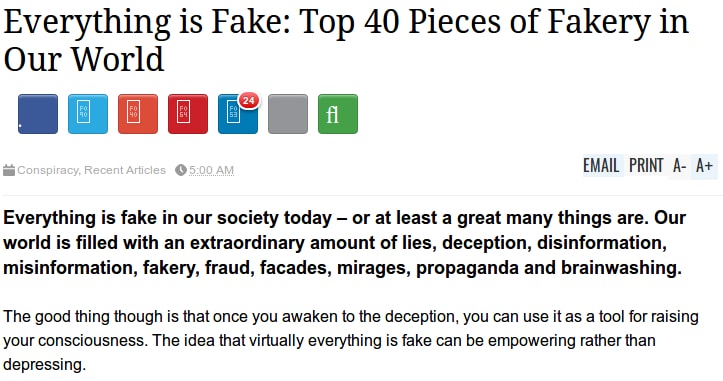
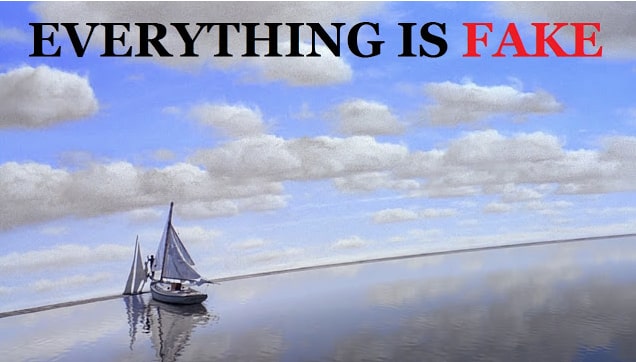
https://wakeup-world.com/2015/08/22/everything-is-fake-top-40-pieces-of-fakery-in-our-world/
Believe it or not, practically everything humanity has been led to believe is a lie.
"The biggest obstacle to a future that we want is the fact that we're operating on the basis of myths and illusions, and generally we're doing just the opposite of what we should be doing."
-G. Edward Griffin
Not only will we realize that practically everything we've been taught has been a lie, but we will begin uncovering evidence of the War Against Humanity.
A clip from a video by The Truther Girls:
Thinking for ourselves, being able to identify truths and reject deceptions are all essential tools needed to advance in consciousness, improve our lives, and stop the downward spiral on which we’re currently traveling.
In order for humanity to become free, people must first realize that they’re being lied to… about practically everything.
While it may be disturbing to discover that we have not been told the truth about many things, we should take comfort in knowing that we are now on the right path, ready to improve our lives, and to move on to the next steps of our evolution.

Back to the Section 2 Menu
On to Section 3